Herman Daly (1938-2022): Up to the Steady State Economy
by Brian Czech
Herman Daly, the champion of steady-state economics, passed away in the presence of beloved family members on October 28, 2022. In the process, a world in dire need of Herman’s wisdom became a lesser place. Yet we can be grateful for the 84 years he graced the earth and for the legacy he’s left us.
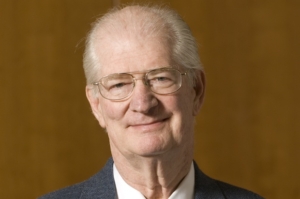
Herman Daly.
An excellent festschrift edited by Joshua Farley, a sweeping biography by Peter Victor, several obituaries, and numerous social media posts have celebrated Herman’s life. Therefore, I won’t delve into Herman’s biographical data and bona fides, other than to remind readers of his professorships at Louisiana State University (1968-1988) and the University of Maryland (1994-2010), plus his senior economist position at the World Bank in between (1988-1994). I’ll add only that, in his retirement, Herman served on the CASSE board of directors (2010-2022) and doubled as our economist emeritus (a nonpaid advisory role) from 2017-2022.
Given the nature of the Steady State Herald, my tribute to Herman will be partly personal, but primarily professional. I fear it will be woefully incomplete. I spoke with Herman on well over a hundred occasions, mostly by phone and especially during my executive directorship of CASSE (2017-present). We shared the basic pleasantries—the weather, the news and the like—and I cherished his friendship. Yet our conversations turned quickly and productively (in my opinion) to academic issues and strategic concerns for advancing the steady state economy.
Herman Changed Lives
I count myself as one among the thousands, possibly hundreds of thousands, of students whose lives were forever changed by Herman. I’d like to describe how I “met” Herman, as it was a moment of great excitement and enlightenment.
In 1996, after analyzing the causes of species endangerment as part of my Ph.D. research, it struck me that the causes were like a who’s who of the economy: agriculture, logging, mining, manufacturing, various services, infrastructure, etc. This was a presidential election year when American politicians were trying to have their cake and eat it too with the win-win rhetoric that “there is no conflict between growing the economy and protecting the environment.” I concluded that ecologists like myself had a role to play in clarifying the conflict between economic growth and environmental protection, starting with wildlife conservation.
Much to my chagrin, the wildlife ecology literature had literally nothing pertaining to economic growth. The forestry, fisheries, range management, and other natural resources journals also came up dry. I tried key phrases like “limits to growth,” “conflict between economic growth and environmental protection,” and “alternatives to economic growth.”
Finally, one day in the main library at the University of Arizona, I encountered a nascent body of literature called “ecological economics.” One name was particularly prominent: Herman Daly of course. And voila, “steady state economy” appeared as well. The phrase instantly resonated.
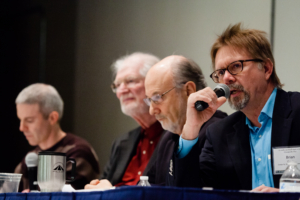
Herman Daly changed lives. Left to right: Rob Dietz, Herman Daly, Peter Victor, Brian Czech (2008). (CC BY-NC 2.0, Chesapeake Bay Program)
The first item I located and read was Herman’s “Introduction to Essays Toward a Steady-State Economy” (pages 11-47 in Valuing the Earth, a 1993 volume edited by Daly and K.N. Townsend). The introduction alone struck me as having the most potent policy implications I’d ever seen. It didn’t take long and I was interpreting the Endangered Species Act (the broader subject of my dissertation) as an implicit prescription for a “steady state economy.”
But this isn’t about me or even conservation at the moment; the point is about Herman. How many of us can remember precisely where we sat in a library on a day 26 years ago, what we read, why we read it, and how it made us feel? Such was the impact of the first sample of Daly’s writing I so fortunately encountered. The writing was impeccable: crystal clear, conceptually compelling, and exceedingly relevant to wildlife conservation, environmental protection at large, and so much more, as I’d learn over the years.
To top it off, Herman was the master of metaphor. Who could forget his cook-and-kitchen metaphor for the factors of production? Herman rolled with metaphors as naturally as Trevor Noah rolls with punchlines.
Moreover, Herman hadn’t just come up with a penetrating analysis. He offered the solution to the problem, or certainly the problem that most concerned me at the time (namely, biodiversity loss). The solution, simply put, was the steady state economy. It truly changed my life, giving me a perfectly legitimate—albeit profoundly difficult—goal to pursue. I wasn’t stuck with nebulous notions of “ecosystem management” or oxymoronic offerings like “green growth.” I could take my recently minted, policy-oriented Ph.D. and put it to use in the service of a bona fide solution.
I’ve said it hundreds of times and hope to hundreds more: Conservation is a steady state economy. Each utterance and echo is a tribute to Herman Daly.
Herman Daly, CASSE, and the Scientific, Professional Societies
I immediately incorporated Daly’s steady-state principles into the concluding chapters of my Ph.D. dissertation. Moreover, steady-state economics became my passion. I strove to rectify the absence of steady-state economics in the scientific, professional natural resource societies (The Wildlife Society, American Fisheries Society, etc.) and their journals, starting somewhat of a movement to unify these societies with a position on economic growth. The basic idea was that, once the scientific societies had refuted the win-win rhetoric of “no conflict,” the big environmental NGOS (Sierra Club, National Wildlife Federation, etc.) would have little choice but to get on board, thereby spreading steady-state economics into millions of membership households. At a minimum, they’d be exposed as unsound if they participated in the win-win rhetoric.
At the outset of this movement, it seemed that the vast majority of natural resources professionals had never heard of the steady state economy, but key intellectuals had. For example, when I approached The Wildlife Society’s governing council about adopting the position at their annual conference in 2004, TWS president Daniel J. Decker asked, “What does Herman Daly think about it?” Fortunately, the answer to that question was forthright, because Herman was one of the first to sign the CASSE position on economic growth earlier in the year (on May 5, to be precise).
A brief aside about the formation and role of CASSE will help to contextualize the position-taking movement. CASSE had been formed as a response to political suppression in the U.S. Fish and Wildlife Service, the headquarters of which I worked in from 1999-2017. At first, agency leaders were enamored with a fresh, penetrating assessment of the relationship between economic growth and wildlife conservation. Many of them concurred that Herman’s concept of a steady state economy was indeed the ultimate solution for wildlife conservation.
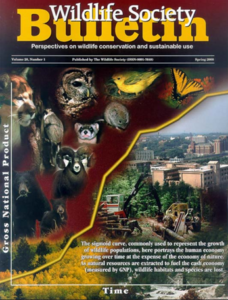
A collage speaks thousands of words about the conflict between economic growth and wildlife conservation. (Wildlife Society)
Unfortunately, the concurrence was flooded out at the confluence of growth politics in the Washington, DC beltway. As early as 2001 I started receiving orders to cease any further communications about the conflict between growth and conservation. This type of suppression in the federal government was roughly akin to what Herman encountered at the World Bank in the decade prior. It was hard to take, so I established CASSE in 2003 with a tidy little board of three off-duty FWS employees including myself. I drafted a position on economic growth stemming from my Ph.D. studies, including most notably Herman’s writings. I’d wear the CASSE hat on nights and weekends—or at conferences while on leave from the government.
After vetting the draft CASSE position among leaders in the U.S. Society for Ecological Economics—most notably Herman himself—in May of 2004 we started circulating the position for the signatures of steady-state supporters. Herman was our fifth and most crucial signatory.
Thanks largely to Herman’s imprimatur and a rapidly growing list of other signatories, Dan Decker and The Wildlife Society decided to adopt a position on economic growth tailored slightly from the CASSE position. So did the U.S. Society for Ecological Economics (they were first, actually), the American Society of Mammalogists, the Society for Conservation Biology (North America Section) and a few other scientific professional societies from 2004-2010. Furthermore, numerous organizations simply endorsed the CASSE position, including some of the leaders in conservation science (for example, the Conservation Biology Institute and the Manomet Center for Conservation Sciences).
In the midst of these efforts I received one of the most meaningful rewards I could hope for. It came in the form of a statement by Herman. I wish I had a recording, for I would play it often as a means of encouragement. Yet I “play” it in my mind often enough. Herman said something to the effect of, “You know, Brian, I have to say, this effort to get these positions adopted; it’s the most encouraging thing I’ve seen so far.”
Obviously, the context implied that the CASSE effort was the most encouraging thing pertaining to advancing the steady state economy that he’d seen until then. Herman had a complete life outside of steady-state economics, which his family and his church (in which he was quite active) would know far more about. But the fact that an effort we’d developed at CASSE, for purposes of advancing the steady state economy, was a highlight of Herman’s professional reflections meant the world to me.
Unfortunately, the efforts to unify the scientific, professional societies—and thenceforth the big environmental organizations—were only moderately successful. We fell short with the Ecological Society of America, American Fisheries Society, and even the International Society for Ecological Economics; by a single governing vote in each of the latter two cases! I hesitate to say, “Ultimately, we fell short,” because all these scientific societies and membership NGOs will be forced to adjust their messaging on economic growth as ecological economics, sound science, and common sense come to bear in the coming years and decades. Herman Daly’s legacy will play a pivotal role in speaking truth to power about the fundamental conflict between economic growth and environmental protection, economic sustainability, national security, and international stability.
Up to the Steady State Economy
Herman was one of those rare individuals who everybody loved; everyone who knew him to any personal degree at least. I realize that’s a sweeping generalization that can’t be proven, but I’ve spoken with scores of friends, colleagues, and acquaintances of Herman who all found him to be remarkably nice, kind, congenial, and enjoyable to be with or correspond with.
That’s not to say he had no enemies, of a professional sort at least. For starters were the neoclassical economists whose oxen had been gored by Herman’s metaphors. Presumably some of the pro-growth policy tanks (Cato Institute, for example) weren’t enamored with him, either. But surely no animosity would have been personal. Herman was just too nice to be disliked.
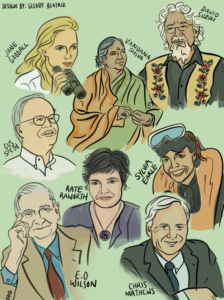
CASSE signatories and, therefore, friends of Herman Daly on some level. (Credits: CASSE intern Glendy Beatriz)
It didn’t hurt that he was a modest man. While he’d stand his ground in an academic debate, he wasn’t one to boast or even hint at his abundant knowledge or superior intelligence. He’d simply say what he knew or deduced and let it stand at that, except when giving credit to some of his favorite influences such as Alfred North Whitehead, Frederick Soddy, and of course Nicholas Georgescu-Roegen.
Herman had time—made time—for anyone seeking his counsel; everyone from university freshmen to Prince Charles (literally). He had not a shred of arrogance. Certainly none was detectable and, if he ever felt any flaring up, he would have doused it forthwith. That’s my guess because he had an abiding faith and walked the talk of the United Methodist Church, occasionally assisting with sermons at service. The way I see it, he was the best of Christians: seldom proselytizing but always exemplarizing.
And so, nearing the end of a woefully incomplete tribute, perhaps the noting of Herman’s faith provides a segue to a proper conclusion…
About fifteen years ago I was invited to provide an overview of steady-state economics to a very small, faith-based, multi-denominational group of theologians and ministers at Catholic University. Ideally it would have been Herman himself giving such a presentation to this particular group—they certainly knew of Herman—but exigencies led them to settle for me.
I provided the overview, and then we went around the group, each one adding or probing for complementary, theological insight. One thoughtful minister paused at length, stroked his chin, and pronounced, “The steady state economy… now that’s the Kingdom of God.” I’ll let readers ponder the theology.
Meanwhile, and for all we know, Herman’s reached the steady state economy at last.
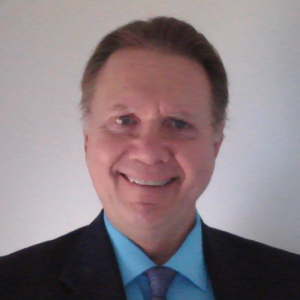 Brian Czech is CASSE’s Executive Director.
Brian Czech is CASSE’s Executive Director.
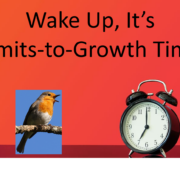
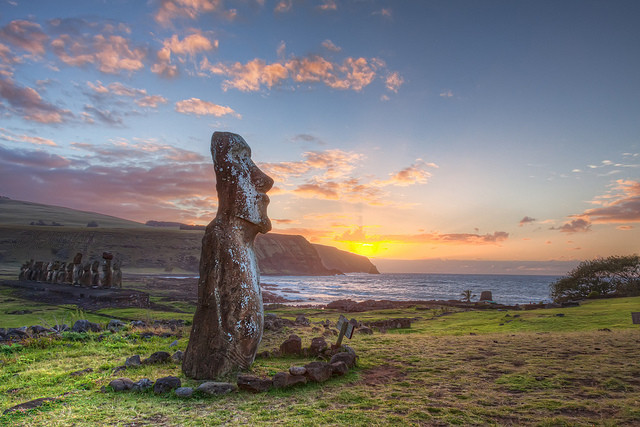
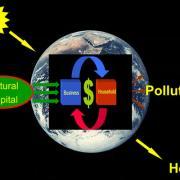

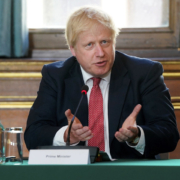


The burden is on us to make his vision our reality.
Such a loss! I came to this website several years ago after reading an article somewhere I forget by Herman Daly. I was struck by the logic and reasonableness of the steady state economic theory (I have no training in economics). I knew then that there was a theory that could explain the cognitive dissonance I experienced following the news media and government explanations of how the world economy functioned when anyone paying even a little attention could see was wrong. He will be missed.
RIP Herman Daly – and lovely eulogy. The Common Good book is still one of my all time favourites. You are absolutely right about the theological connection. There is an incredible and untapped overlap between steady state economics and Social Catholic Teaching in relation to subsidiarity – and the political economy later described by Chesterton and Belloc as ‘distributism.’ Dale Alquist has been suggesting that we should rename distributism as ‘localism’. It was always meant to avoid the twin extremes of the socialism (the State) and capitalism (the Market). But I prefer Livelihood in the sense of Polanyi. For me Daly’s vision was always about a predominance of embedded markets and communitarian face-to-face economy of place-bound family and neighbourly relations – predominance without excluding some larger scale activities based on more abstract price-setting markets. Anyway, he didn’t started the conversation but he sure as heck carried it on in a productive way. I hope now that Distributists, POlanyi crowd, the greens and the steady-staters will start talking a great deal more. Perhaps a conference on Polanyi, Schumacher, Steady State and Distributism/Catholic Social Teaching
The first time I read his book it dawned on me pretty early on that this was our only solution for this planet. I will forever appreciate and spread this man’s wisdom.
A wonderfully written tribute. Wish CASSE all success in carrying forward the steady state mission.
A moving and powerful tribute to Herman Daly. Thank you, Brian. When I was once asked to teach a class in a French university on degrowth vs smart growth, Herman Daly’s writings became the objective and impeccable core reading for that course, and I witnessed that his ideas made a solid impact on the skeptical students, much more than anything I could have said. I agree with Carter Dillard that the burden is on us to make his vision a necessity for our species and the others we share the earth with.
A solid tribute, and I learned a lot – thank you Brian.
For me, reading Daly’s book “Beyond Growth” was a watershed moment. Finally, I thought, economics that answer *all* the hard questions in a non-contradictory way! That led to more searching and ultimately to CASSE.
R.I.P., Prof. Daly; am still enjoying your brilliant books. Great tribute and most interesting history, Brian. Thanks so much. Regarding the theological aspect, just so people get a full and broad view, I would add the following. The steady state economy very well may be the “Kingdom of God”; however, it definitely also is the Way of Taoism, a faith which is more attuned to Nature than any other on this planet.
Happy Trails
Daly has joined the (secular) heavenly hosts but will have good company with other deceased great thinkers such as Michael Soule, Dave Brower, Dave Foreman, Doug Tompkins, who will I am sure have great conversations in that pristine cloudforest in the sky. Meanwhile we mortals need to find new principled leaders, and fast….but none are yet in sight.
Brian, thanks for the moving article. You noted Herman’s humility, and I want to add one more piece of CASSE insider information on that topic. When we first started the blog on steadystate.org, it was called the “Daly News.” I REALLY wanted to use that name as a tribute to Herman, and I thought the cleverness would resonate with readers. Plus he was one of the main writers (the main rotation was Herman, Brian, Brent Blackwelder, and me). Herman didn’t really like the idea, and we had to do a lot of convincing for him to let us attach his name. Working on the Daly News was a joy and one of the highlights of my career. I’ll miss Herman and, like CASSE, I’ll keep doing what I can to spread his ideas. Best wishes to all the friends and fans of Herman!
Brian, your Daly tribute is communicated and received as a sincere and deeply appreciative reflection on your close, collaborative relationship with an exemplary human being and influential mentor. Thanks for sharing!
Lovely, heartfelt, and true tribute. It is sad that convenient lies (the cake without ingredients) seem so easy to make into orthodoxy, while obvious truths (physics matters, growth can’t continue) struggle to be heard. The transition from “grow without limit” to “feedback regulated steady state” is the transition to accepting the science of biology (where too much can kill you as easily as too little and unrestricted growth is deadly cancer). Society hasn’t yet understood Darwin–a theory with a steady state imposed by habitat limits. The disciplinary silo problem needs fixing. Economics, Demography, Ecology, and Ethics need to talk. Keep up the good work at CASSE. And your initial strategy of trying to wake up the scientific societies, including economists this time, was a pretty good idea, although just as hard to implement as teaching Exxon or Congress or the Pope. But failing to convince, the truth is still true and needs to be repeated until heard..
Nicely done Brian. Nicely done.
I’m really unhappy. Daly living into his 90s would have been better. My own first experience was among the basement bookshelves, containing all the books on every prof’s syllabus as required reading, one Saturday in 1981 while browsing at the UT Co-op (University of Texas at Austin) bookstore. What I thought was probably a junior economics faculty member had a set of books, including Steady-State Economics (1977), which together revolutionized how I thought about matters. Steady-State Economics was by far the most important of those. Over three and a half decades passed before I learned that Nicholas Georgescu-Roegen had been a visiting prof at UT. I have one letter response from Daly from something I wrote him about, while he was at LSU, a project I never ended up pursuing or having the knowledge or ability to pursue. But I need to find that letter and establish a special place for it in my records.
Thanks Brian, this is a very moving tribute. I had come across Herman’s writings around 2000 and it really resonated with me. I was growing increasingly frustrated with the cognitive dissonance and narrow focus in the media’s daily pronouncements about all things economic and markets. Economics is not my field but its ideas are imposed on all of us. We are expected to accept them without question. My frustration especially grew with the constraining effects of environmental economics and its influence on the sustainability field and on many environmental NGOs. But I couldn’t quite put my finger on the mechanics. About 10 years ago I joined a group that read and discussed, chapter by chapter, Herman Daly and Josh Farley’s Ecological Economics: Principles and Applications. It was one of the best things I ever did and it was fun too. The fog lifted. That book gave me a crash course in orthodox economics, its limitations and its alternatives. It is now up to us to carry the torch and lift the fog in our surroundings. I am forever grateful to Herman.
I was saddened to hear that Herman Daly had passed away. His work on The Steady State Economy, was one that I had included in my Ph.D thesis, in the 1980s. I also included his theories in the Environmental Economics syllabus that I prepared for a post graduate course at Osmania University, Hyderabad, India. He was a pioneer in the field of Environmental Economics, and his work is very much relevant today. We will really miss his contributions for a safer world in the years to come.
Condolences to all who knew Herman and who are feeling his loss.
On reading this article I have come to realise that Herman Daly laid the foundation for this valuable soap box on which we stand and communicate.
He has tirelessly debunked the accepted myth of continuous growth being a panacea.
Such traditional thinking is akin to believing in a flat infinite world while keeping your head in the sand as regards to potential alternatives.
Its a fragile world and its not infinite – Its round, look up my friend.
RIP Herman
Herman Daly was my PhD dissertation advisor at LSU (1978-82). He kindly directed me in my first steps at integrating my education and work experience in Civil/Water Resources Engineering and Christian Theology. He was indeed a gentleman and a scholar, and my friend. God bless you, Herman.
Thank you, Brian, for this wonderful thoughtful tribute.
I never met Daly but he changed my life. As a graduate student in economics at DePaul in 1985, I was doing a thesis that challenged the conventional model of the relation between stocks and flows as exhibited in the circular flow model. Dr. Waters, my thesis advisor and editor of The Review of Social Economy, gave me the Dec 1985 issue which contained the article by Daly ” The Circular Flow of Exchange Value and the Linear Throughput of Matter-Energy: A Case of Misplaced Concreteness”. At last, I got validation that I was on the right track!
Fast forward to 2004 and I am teaching economics at Milw Area Technical College and one of my students says. “You know, you sound a lot like what I read on this website for the organization CASSE”. Wham. I am hooked on CASSE. I go on to introduce a course Ecological Economics and use the book ‘Enough Is Enough” by Dietz.
I also become friends with you, Brian, and give support to CASSE, among my other causes including anti-war activism.
So thank you Herman Daly, Brian, and Rob and Dr. Waters. Peace.
In my list of people to thank, I should also have mentioned Luz, the excellent MATC instructor who is now teaching Ecological Economics and is a steady stater with 2 children, voluntary simplicity and solar energy..
The tardiness of my contribution bespeaks my age-related decline, but, having just read your gracious tribute, Brian, I hasten to applaud it and to commend you again for the crucial effort you have undertaken with CASSE.
I am devastated by Herman’s passing. We were dear friends since grad school at Vanderbilt in the early 1960s (when I had the pleasure of introducing him to a lovely Brazilian girl studying at Scarritt College across the street, who is now his bereft widow).
My Latin American focus led me to sample a variety of disciplines but landed me in Political Science, a field rivaling Economics for its myopia. Herman’s thinking shaped my research, writing, and teaching from the outset, and since my official retirement in 2004 I have annually offered an Honors Colloquium exposing undergraduates to these heretical ideas (immensely assisted by the publication in 2013 of Rob Dietz’s marvelously accessible Enough Is Enough).
Herman was, as you so well describe, Brian, an exemplary human being as well as a learned scholar and gifted writer. He also excelled in his roles as husband, father, and friend.
If our ungovernable species by some miracle survives our selfishness and profligacy, Herman Daly will be revered for his heroic efforts to lead us to a gentler, juster, more fulfilling, and, of course, more sustainable way of life.